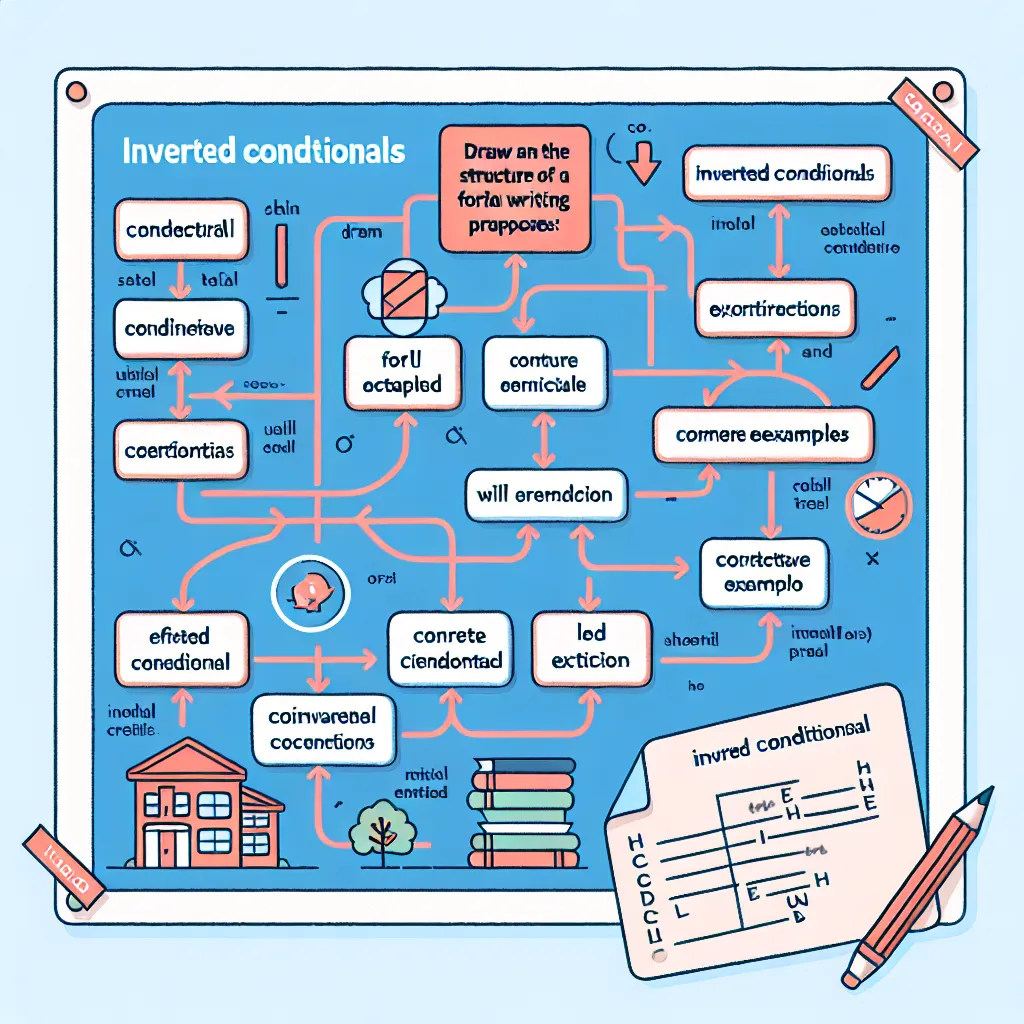Inverted conditionals are an advanced grammatical structure that can significantly enhance the formality and sophistication of your writing in the IELTS exam. These structures are particularly useful in the Writing and Speaking sections, where demonstrating a high level of language proficiency is crucial. Let’s explore how to effectively use inverted conditionals in formal writing and how they can boost your IELTS score.
Understanding Inverted Conditionals
Inverted conditionals are a more formal way of expressing conditional sentences. Instead of using “if” at the beginning of the clause, we invert the subject and auxiliary verb. This structure is commonly used in academic and professional writing, making it particularly relevant for IELTS candidates aiming for higher band scores.
For example:
- Standard conditional: If I had known earlier, I would have helped.
- Inverted conditional: Had I known earlier, I would have helped.

Grammatical Structure and Usage
Formula for Inverted Conditionals:
Auxiliary verb + Subject + Main verb, [Result clause]
It’s crucial to understand that inverted conditionals are most commonly used with past perfect and modal verbs. Here are some examples:
-
With ‘had’ (past perfect):
- Had the government invested more in education, literacy rates would have improved significantly.
-
With ‘should’:
- Should you require any further information, please do not hesitate to contact us.
-
With ‘were’:
- Were the climate conditions more favorable, agricultural output would increase dramatically.
-
With ‘had + subject + past participle’:
- Had the researchers conducted more trials, their findings would have been more conclusive.
-
With ‘were + subject + to + infinitive’:
- Were the company to implement these changes, productivity would likely soar.
Applying Inverted Conditionals in IELTS Writing
Incorporating inverted conditionals in your IELTS Writing Task 2 essays can demonstrate a high level of grammatical control and formal language use. Here’s an example of how you might use this structure in an essay about environmental policies:
“Environmental protection is a critical global issue. Were governments to implement stricter regulations on industrial emissions, we could see a significant reduction in air pollution levels. Moreover, had policymakers taken action earlier, many of the current environmental crises might have been averted.“
In this example, the inverted conditionals add a layer of formality and sophistication to the argument, potentially boosting your score in the Grammatical Range and Accuracy criterion.
Inverted Conditionals in IELTS Speaking
While inverted conditionals are more common in writing, using them appropriately in the Speaking test can also impress the examiner. For instance:
Examiner: “What would you do if you were in charge of improving public transport in your city?”
Candidate: “That’s an interesting question. Were I in charge of improving public transport, I would prioritize expanding the metro system. Additionally, should funding be available, I would invest in electric buses to reduce emissions.“
Strategies for Higher Band Scores
To achieve higher band scores (7+) in IELTS, it’s essential to use a mix of conditional structures, including inverted conditionals. Here’s a comparison:
-
Band 6: Mostly uses standard conditionals correctly.
“If the government invests more in renewable energy, it will help reduce carbon emissions.” -
Band 7-8: Incorporates some inverted conditionals along with standard forms.
“Were the government to invest more in renewable energy, it would significantly reduce carbon emissions. If implemented correctly, such policies could lead to a greener future.” -
Band 9: Seamlessly integrates various conditional forms, including inverted conditionals, with high accuracy.
“Had policymakers recognized the potential of renewable energy earlier, we might already be seeing lower carbon emissions. Should current investment trends continue, we can expect a substantial shift towards cleaner energy sources within the next decade. If we combine this with improved energy efficiency, the impact could be transformative.”
Common Mistakes to Avoid
-
Incorrect verb form:
- Incorrect: “Were the scientists discovered a cure, many lives would be saved.”
- Correct: “Were the scientists to discover a cure, many lives would be saved.“
-
Forgetting to invert in questions:
- Incorrect: “Had you visited Paris before?”
- Correct: “Had you visited Paris before?” (No change needed as it’s already inverted)
-
Using ‘if’ with inverted conditionals:
- Incorrect: “If had I known about the meeting, I would have attended.”
- Correct: “Had I known about the meeting, I would have attended.“
-
Incorrect use with modal verbs:
- Incorrect: “Would I have the opportunity, I would travel the world.”
- Correct: “Were I to have the opportunity, I would travel the world.“
-
Misplacing ‘not’ in negative forms:
- Incorrect: “Had not we arrived early, we would have missed the flight.”
- Correct: “Had we not arrived early, we would have missed the flight.“
Conclusion
Mastering inverted conditionals can significantly enhance your formal writing skills and boost your IELTS scores. Practice incorporating these structures into your essays and speaking responses, but remember to use them judiciously and in conjunction with other complex structures. As you prepare for your IELTS exam, try creating sentences using inverted conditionals related to common IELTS topics such as education, technology, environment, and social issues. This will help you become more comfortable with the structure and ready to use it effectively on test day.
For further practice, you might want to explore how inverted conditionals can be used to express hypothetical situations or how they can add formality to your speculative statements. Remember, the key to success in IELTS is not just knowing these structures, but being able to use them accurately and appropriately in context.